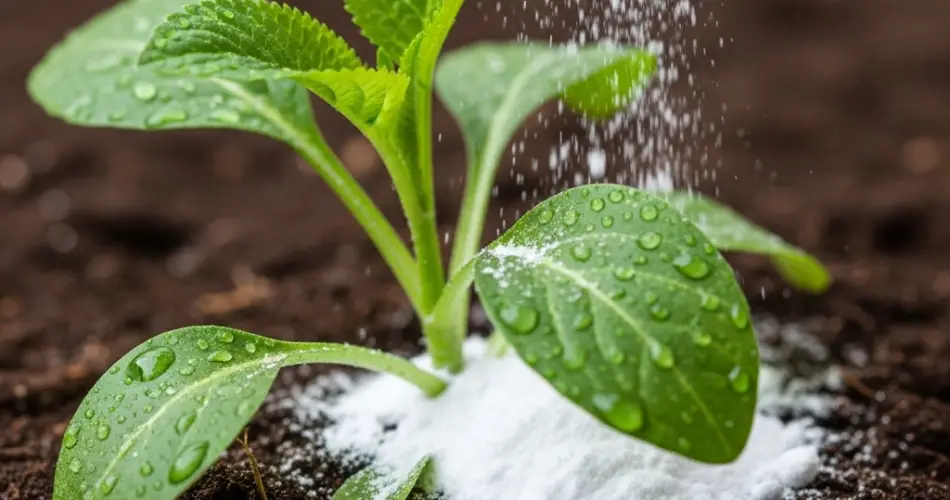Baking soda, a common kitchen staple, is more than just a baking ingredient. In the garden, it’s a natural, affordable, and eco-friendly remedy for a variety of plant issues. With its antifungal properties, pest-repelling potential, and ability to balance soil pH, baking soda can help keep your plants healthy without the use of harsh chemicals.
Simple, safe, and effective, baking soda offers several easy solutions for gardeners looking to maintain a lush and thriving garden with minimal effort.
Why Baking Soda Works in the Garden
Baking soda, or sodium bicarbonate, is a mild alkaline compound that can help modify the environment around your plants. When used correctly, it can:
-
Prevent fungal diseases like powdery mildew and black spot
-
Deter common garden pests such as aphids and ants
-
Neutralize acidic soils, aiding plants that prefer neutral to alkaline conditions
-
Clean garden tools to stop disease from spreading
It’s a gentle, multipurpose substance that’s safe for both edible and ornamental plants when used in moderation.
1. Control Powdery Mildew and Fungal Issues
One of the most popular uses of baking soda in the garden is as a natural fungicide. Fungal diseases like powdery mildew, black spot, and rust thrive in warm, damp environments. Baking soda creates an inhospitable surface for fungal spores, stopping them from spreading.
DIY Fungicide Spray Recipe:
-
1 tablespoon baking soda
-
1 tablespoon vegetable oil or horticultural oil
-
1 teaspoon mild liquid soap (castile or biodegradable dish soap)
-
1 liter of water
Mix the ingredients well and pour into a spray bottle. Apply to affected leaves every 7 to 10 days, especially after rainfall. Be sure to spray early in the morning or late in the afternoon to avoid leaf burn.
This spray is most effective as a preventative measure or during early signs of disease.
2. Repel Garden Pests Naturally
Baking soda alone doesn’t kill insects, but it can help repel soft-bodied pests like aphids, spider mites, and whiteflies when mixed with other ingredients. The alkaline nature of baking soda can irritate or disrupt pest feeding behaviors.
Pest Repellent Spray:
-
1 tablespoon baking soda
-
1 teaspoon neem oil (or vegetable oil)
-
1 teaspoon mild soap
-
1 liter of water
Spray on the undersides of leaves and around new growth where pests tend to gather. Repeat weekly or after rain.
For ant trails, simply sprinkle dry baking soda where they travel. When mixed with powdered sugar (equal parts), this blend may also help control ant infestations by encouraging them to carry it back to the nest.
3. Boost Tomato and Vegetable Health
Some gardeners use baking soda to sweeten the flavor of tomatoes by reducing soil acidity. Lightly sprinkling a small amount of baking soda around the base of tomato plants (not on the leaves) can neutralize excess acidity in the soil, which may influence the flavor of the fruit.
How to Apply:
Sprinkle 1–2 teaspoons of baking soda around the plant base once every month. Water as usual, and monitor plant response. Avoid overuse, as too much alkalinity can harm beneficial soil microbes.
4. Weed Prevention in Cracks and Pathways
If you have weeds sprouting between pavers or sidewalk cracks, baking soda can help. Sprinkling it directly into these areas creates a harsh environment for weed growth without harming nearby plants.
Avoid applying baking soda to garden beds or near desirable plants, as it can affect soil pH and potentially harm sensitive roots.
5. Freshen Compost and Reduce Odor
Compost piles can sometimes develop strong odors, especially if they’re too wet or rich in nitrogen. Baking soda helps neutralize smells and balance pH.
Usage Tip: Sprinkle a light layer of baking soda on top of the compost pile to reduce odor. Use sparingly—too much can slow decomposition.
6. Clean and Sanitize Garden Tools
Dirty tools can carry disease from one plant to another. Baking soda makes an excellent non-toxic cleaner.
Tool Cleaning Paste:
-
Mix baking soda with a bit of water or vinegar to form a paste
-
Use a brush or cloth to scrub tools, pots, and containers
-
Rinse thoroughly and dry to prevent rust
Regular cleaning keeps your tools in good shape and reduces the risk of spreading fungal spores or pests.
7. Deodorize and Clean Plant Containers
Plastic and ceramic pots can accumulate buildup and develop unpleasant smells over time. Soaking them in a solution of water and baking soda helps eliminate residue and neutralize odors.
Soaking Solution:
-
1/4 cup baking soda
-
2 liters of warm water
Soak containers for 30 minutes, then scrub clean. This is especially helpful before reusing pots for new plantings.
A Word of Caution
While baking soda is generally safe for most plants, overuse can affect soil health by increasing alkalinity too much. Always test sprays on a small area of the plant first and wait 24 hours to observe any reactions. Avoid using it repeatedly on acid-loving plants like azaleas, blueberries, and hydrangeas.
A Simple Solution with Big Impact
Baking soda may seem humble, but its usefulness in the garden is anything but. From controlling fungal diseases to freshening compost and cleaning tools, this natural remedy has earned its place as a trusted gardening companion.
With just a box of baking soda and a few household items, you can promote plant health, protect your garden from common threats, and maintain a cleaner, more sustainable gardening routine.



